Hyundai Kona vs Hyundai IONIQ 5 – Differences & prices compared
Compare performance, boot space, consumption and price in one view.
Find out now: which car is the better choice for you – Hyundai Kona or Hyundai IONIQ 5?
The Hyundai Kona (SUV) comes with a Petrol, Full Hybrid or Electric engine and Manuel or Automatic transmission. In comparison, the Hyundai IONIQ 5 (SUV) features a Electric engine with Automatic transmission.
When it comes to boot capacity, the Hyundai Kona offers 466 L, while the Hyundai IONIQ 5 provides 520 L – depending on how much space you need. If you’re looking for more power, decide whether the 218 HP of the Hyundai Kona or the 609 HP of the Hyundai IONIQ 5 suits your needs better.
In terms of consumption, the values are 14.60 kWh4.50 L per 100 km for the Hyundai Kona, and 15.60 kWh for the Hyundai IONIQ 5.
Price-wise, the Hyundai Kona starts at 23100 £, while the Hyundai IONIQ 5 is available from 37600 £. Compare all the details and find out which model fits your lifestyle best!
When comparing the Hyundai Kona to the Hyundai IONIQ 5, the key differences lie in their size and propulsion. The Kona, a subcompact SUV, offers a versatile choice between gasoline and fully electric powertrains, ideal for those seeking practicality in urban settings. Meanwhile, the all-electric IONIQ 5, built on the advanced E-GMP platform, emphasizes futuristic design, spacious interior, and cutting-edge technology, positioning it as a remarkable choice for environmentally conscious drivers.
Hyundai Kona
The Hyundai Kona blends a bold design with a versatile interior, making it a standout choice in the compact SUV market. Its crisp handling and responsive steering provide an engaging driving experience, whether in the city or on the open road. The vehicle also offers a range of features designed to enhance comfort and connectivity, ensuring a pleasurable journey for both driver and passengers.
details @ hyundai.news
@ hyundai.news
 @ hyundai.news
@ hyundai.news
 @ hyundai.news
@ hyundai.news
 @ hyundai.news
@ hyundai.news
Hyundai IONIQ 5
The Hyundai IONIQ 5 showcases a bold and futuristic design that captures attention with its striking facade and sharp lines. This electric vehicle offers an impressive blend of performance and efficiency, making it a compelling choice for environmentally conscious drivers. Inside, the spacious and tech-forward interior provides a comfortable and engaging driving experience for both driver and passengers.
details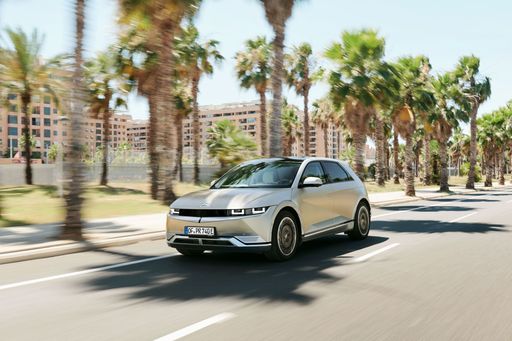 @ hyundai.news
@ hyundai.news
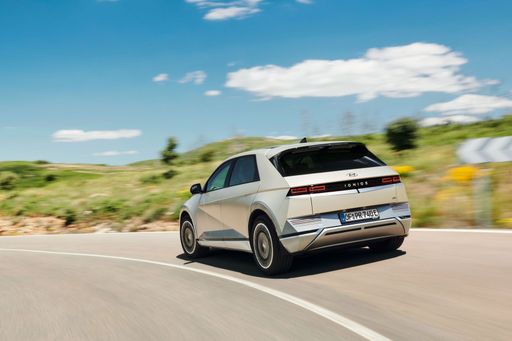 @ hyundai.news
@ hyundai.news
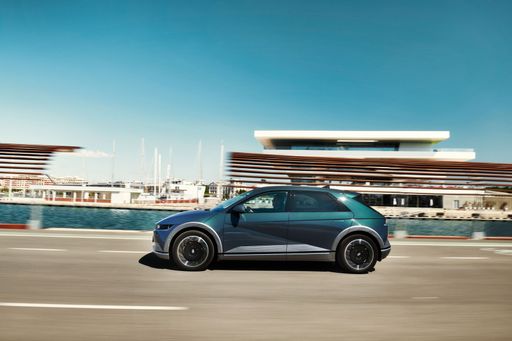 @ hyundai.news
@ hyundai.news
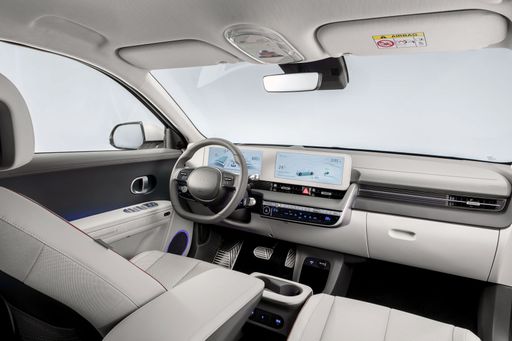 @ hyundai.news
@ hyundai.news
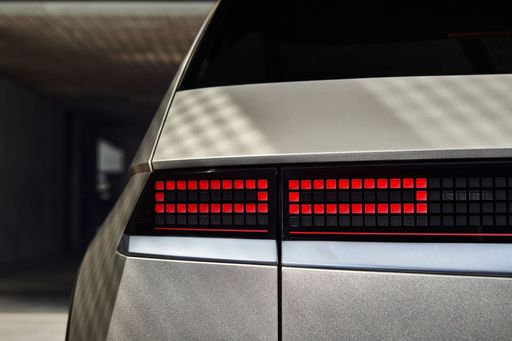 @ hyundai.news
@ hyundai.news
The Electrifying Hyundai Face-Off: Kona vs. IONIQ 5
With the automotive world rapidly embracing electric mobility, Hyundai is making strides by offering strikingly different yet equally compelling vehicles. The Hyundai Kona and the IONIQ 5 represent two different approaches to the electrification narrative, and potential buyers often find themselves pondering which one suits their needs best. Let's delve into the details to explore what each has to offer.
Design and Dimensions
The Hyundai Kona and IONIQ 5, both proudly wearing the SUV badge, possess distinct personalities. The Kona, with its compact dimensions (length of approximately 4385 mm), offers a nimble edge in urban environments, aided by its height of 1585 mm and width of 1825 mm. The IONIQ 5, on the other hand, takes a more spacious approach, with a length extending to 4715 mm, a width of 1940 mm, and a slightly higher stance at 1605 mm, culminating in a modernist design that hints at its futuristic aspirations.
Powertrain and Performance
The Kona offers versatility with powertrain options ranging from traditional petrol and full hybrids to the fully electric variant. Engine outputs span from 100 HP in the base petrol model up to an impressive 218 HP in its electric guise, offering consumers freedom of choice. Top speeds vary with each variant, reaching up to 208 km/h, and acceleration can go from 0 to 100 km/h in as little as 7.8 seconds.
In stark contrast, the IONIQ 5 exclusively harnesses electric propulsion with a powerful lineup. Power outputs range from 170 HP to a staggering 609 HP, with dual motor options allowing for all-wheel drive variations. This electric SUV boasts an acceleration of 0 to 100 km/h in a mere 3.5 seconds for its performance models, surpassing the traditional benchmarks. Maximum speeds reach up to 260 km/h, placing it in a league of its own.
Efficiency and Range
Efficiency is paramount in any modern vehicle, and both Hyundai offers excel in unique ways. The electric Kona provides a range between 377 km and 514 km, with consumption as low as 14.6 kWh/100km, depending on configuration. For traditional and hybrid variants, fuel consumption varies between 4.5 L/100km and 6.7 L/100km, indicating a focus on economy.
The IONIQ 5, with its larger battery options of 63 kWh and 84 kWh, offers even greater distances, with ranges from 440 km up to an impressive 570 km. Consumption ranges from 15.6 kWh/100km to 21.2 kWh/100km, ensuring that efficiency doesn't compromise on power or performance.
Innovations and Technology
Both vehicles are brimming with cutting-edge technology, but the IONIQ 5 steps into the future with its ultra-fast charging capability, capable of adding significant range in just minutes thanks to its 800V electrical architecture. Interior versatility and eco-friendly materials further amplify its innovative approach to sustainable motoring.
The Kona impresses with its array of driving aids and connectivity options. Though it sits in a more traditional mold, its electric variant shines with a focus on delivering a seamless driving experience without sacrificing the utility expected from a compact SUV.
Verdict
The decision between the Hyundai Kona and the IONIQ 5 boils down to personal preferences and needs. For those seeking a versatile, traditional option with a wide array of powertrains, the Kona stands as a solid choice. However, for those searching for cutting-edge technology, spacious interiors, and future-driven performance, the IONIQ 5 might just be the electric revolution they are looking for. Whichever you choose, Hyundai promises a driving experience that ushers in the future of mobility.

|

|
|
|
|
Costs and Consumption |
|
|---|---|
|
Price
23100 - 41600 £
|
Price
37600 - 64200 £
|
|
Consumption L/100km
4.5 - 6.9 L
|
Consumption L/100km
-
|
|
Consumption kWh/100km
14.6 - 16.8 kWh
|
Consumption kWh/100km
15.6 - 21.2 kWh
|
|
Electric Range
377 - 514 km
|
Electric Range
440 - 570 km
|
|
Battery Capacity
1.3 - 65.4 kWh
|
Battery Capacity
63 - 84 kWh
|
|
co2
0 - 157 g/km
|
co2
0 g/km
|
|
Fuel tank capacity
38 - 47 L
|
Fuel tank capacity
-
|
Dimensions and Body |
|
|---|---|
|
Body Type
SUV
|
Body Type
SUV
|
|
Seats
5
|
Seats
5
|
|
Doors
5
|
Doors
5
|
|
Curb weight
1370 - 1773 kg
|
Curb weight
1955 - 2275 kg
|
|
Trunk capacity
466 L
|
Trunk capacity
480 - 520 L
|
|
Length
4350 - 4385 mm
|
Length
4655 - 4715 mm
|
|
Width
1825 mm
|
Width
1890 - 1940 mm
|
|
Height
1580 - 1585 mm
|
Height
1585 - 1605 mm
|
|
Payload
420 - 490 kg
|
Payload
385 - 530 kg
|
Engine and Performance |
|
|---|---|
|
Engine Type
Petrol, Full Hybrid, Electric
|
Engine Type
Electric
|
|
Transmission
Manuel, Automatic
|
Transmission
Automatic
|
|
Transmission Detail
Manual Gearbox, Dual-Clutch Automatic
|
Transmission Detail
-
|
|
Drive Type
Front-Wheel Drive, All-Wheel Drive
|
Drive Type
Rear-Wheel Drive, All-Wheel Drive
|
|
Power HP
100 - 218 HP
|
Power HP
170 - 609 HP
|
|
Acceleration 0-100km/h
7.8 - 13.3 s
|
Acceleration 0-100km/h
3.5 - 8.5 s
|
|
Max Speed
162 - 208 km/h
|
Max Speed
185 - 260 km/h
|
|
Torque
200 - 265 Nm
|
Torque
350 - 740 Nm
|
|
Number of Cylinders
3 - 4
|
Number of Cylinders
-
|
|
Power kW
74 - 160 kW
|
Power kW
125 - 448 kW
|
|
Engine capacity
998 - 1598 cm3
|
Engine capacity
-
|
General |
|
|---|---|
|
Model Year
2024
|
Model Year
2024
|
|
CO2 Efficiency Class
D, C, E, F, A
|
CO2 Efficiency Class
A
|
|
Brand
Hyundai
|
Brand
Hyundai
|
Hyundai Kona
The Hyundai Kona: A Comprehensive Overview
The Hyundai Kona has established itself as a standout in the compact SUV segment, blending innovation with performance and style. As the automotive world moves towards more sustainable and efficient options, the Kona offers a variety of powertrains, from traditional petrol engines to full hybrids and all-electric models.
Powertrain Options and Performance
The Hyundai Kona's powertrain choices cater to a wide range of preferences. For petrol enthusiasts, the Kona offers a 1.0L T-GDI engine, delivering 100 PS, and a more robust 1.6L T-GDI variant with up to 170 PS. Those looking for efficiency without sacrificing power can consider the full hybrid model, offering 129 PS and an impressive consumption of 4.5 L/100km.
For a greener option, the all-electric Kona provides a compelling case. With battery capacities of up to 65.4 kWh, the electric Kona offers power outputs of 156 to 218 PS, and efficiencies as low as 14.6 kWh/100km, enabling an electric range of up to 513 km.
Technical Specifications and Innovations
Built on a robust platform, the Kona delivers versatility and reliability. With a choice between manual or dual-clutch automatic gearboxes, along with options for front-wheel or all-wheel drive, the Kona ensures a tailored driving experience. The handling is enhanced by the car's lightweight construction, balancing a 1370 to 1773 kg curb weight with dynamic performance.
The Kona's design doesn't compromise cargo space for style; it offers a generous 466 L boot capacity. With a relatively compact body, measuring 4350 to 4385 mm in length, the Kona easily navigates urban environments while still commanding a strong road presence with its 1825 mm width.
Efficiency and Eco-Friendliness
Hyundai is committed to reducing emissions, as evidenced by the Kona's CO2 efficiency ratings, which range from class A for electric models to class D for some higher-performance petrol variants. The focus on reducing environmental impact without sacrificing driving pleasure is notable throughout the Kona range.
Costing and Value
The Hyundai Kona offers commendable value for money. Pricing starts at €26,400 and reaches up to €50,690, depending on the chosen configuration. The monthly running costs range from €956 to €1090, with a cost per kilometre of 38.3 to 43.6 cents, making it a competitive option in its class.
Conclusion: Modern, Efficient, and Versatile
The Hyundai Kona stands as a testament to Hyundai's commitment to innovation, efficiency, and practicality. Whether you are inclined towards a traditional combustion engine, a hybrid for a balance of power and efficiency, or a full electric model for maximum eco-friendliness, the Kona provides a tailored solution for each unique driver preference.
Hyundai IONIQ 5
Introducing the Hyundai IONIQ 5: A New Era in Electric Mobility
The Hyundai IONIQ 5 is a revolutionary addition to the electric car market, blending futurist aesthetics with ingenious technological features. As part of Hyundai's all-electric lineup, the IONIQ 5 exudes a refreshing approach to sustainable motoring, offering a blend of power, efficiency, and innovation that is set to transform everyday driving.
A Futuristic Design
The IONIQ 5 sets new standards in automotive design with its distinctive silhouette. Its clamshell bonnet and pixelated LED light design form a unique visual signature, evoking a sense of modernity and advancement. Built on Hyundai's Electric-Global Modular Platform (E-GMP), this SUV heralds a new direction for electric vehicles, serving both form and function with a flat floor that maximises interior space.
Performance and Efficiency
The Hyundai IONIQ 5 offers a variety of powertrains to cater to different driving preferences. Depending on the model, power output ranges from 170 PS to a staggering 609 PS, with corresponding torque between 350 Nm and 740 Nm. These configurations enable a brisk acceleration capability, reaching 0-100 km/h in as little as 3.5 seconds.
The car’s battery options of 63 kWh and 84 kWh provide flexibility between range and performance. The efficiency of the IONIQ 5 is admirable, with a consumption ranging from 15.6 to 21.2 kWh/100km, ensuring the capability to travel up to 570 km on a single charge.
Innovative Technology
The IONIQ 5 isn't just about efficient propulsion; it's laden with cutting-edge technology that enhances the driving experience. The vehicle includes an ultra-fast charging capability, able to reclaim 80% of the battery life within just 18 minutes. This is complemented by Vehicle-to-Load (V2L) technology, which turns the IONIQ 5 into a power source to charge devices or even other electric vehicles.
Comfort and Convenience
Inside, the IONIQ 5 continues to impress with a spacious and flexible cabin that maximises comfort and utility. Its minimalist dashboard, dual 12.3-inch screens for infotainment and digital instrument cluster, and extensive use of eco-friendly materials contribute to a serene driving environment.
Safety Meets Innovation
Hyundai has equipped the IONIQ 5 with an array of advanced driver assistance systems. These include features such as Smart Cruise Control, Highway Driving Assist, and Remote Smart Parking Assist, ensuring that safety is paramount without sacrificing convenience.
The Future of Sustainable Driving
With a CO2 efficiency class of A and zero emissions, the Hyundai IONIQ 5 signifies a shift towards more sustainable driving practices. Its blend of technology, performance, and aesthetic appeal positions it as a pivotal player in the electric vehicle market, paving the way for a cleaner, greener future in automotive design.
The prices and data displayed are estimates based on German list prices and may vary by country. This information is not legally binding.
